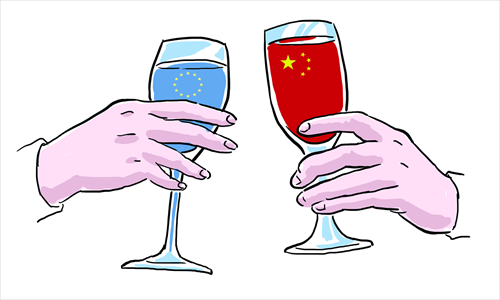EU ready to cooperate on China's role

The year of 2013 is an important year for trade in both the EU and China, with a heavy agenda both for our bilateral relationship and for our joint work at the global level, all against the backdrop of a turbulent world economy.
The new government that has taken the reins in China presents an opportunity for strengthened EU-China cooperation in both these areas. I believe this is also in China's interests, for two reasons in particular.
The first is that over the last three and a half decades, China has become a global economic power strongly relying on international trade. A continued global consensus in favor of free trade is therefore vital for its continued prosperity. Europe and China must work together if this is to be achieved.
In 1978 China produced just over 2 percent of the world's output and accounted for 1 percent of global exports. Today, those figures have risen to 15 percent and 13 percent respectively, making China the largest trading nation in the world.
Exports and imports add up to 47 percent of its GDP. Exports have driven investment and consumption, which have in turn driven demand for imports, and these imported goods, often of machinery or other inputs to future production, have in their turn helped China to gain new customers for its exports. Trade with the EU has been essential to that process, as China's largest export market and now its largest supplier in a €475 billion ($725 billion) commercial relationship, and will continue to be essential in the future.
This virtuous circle of trade and growth, however, is not associated with market forces alone. It is founded on the global political consensus underpinned by law and thus a political choice, on the need for open markets.
China's new position as world trade power implies that it is in its own interest to become a world trade leader. China should work with the EU to lead global opinion in favor of free trade. That means playing a constructive role within the WTO and the G20, which will be crucial to arrive at a deal, centered on trade facilitation, at December's WTO ministerial meeting in Bali.
But leading is not only about multilateral talks. Major powers also need to lead by example and for China, this raises questions of the role of the state. Over the past 30 years of reform and opening-up, China has already come a long way, particularly in relation to the reform of its State-owned sector. Europe and its other major international trade partners are confident that this process will continue as China further opens its markets, particularly the services sector, to ensure more balanced economic growth going forward.
Last year's joint report by the World Bank and the Development Research Center of the State Council may help address this question. It states that "redefining the role of government" will be one of the most important factors in China's future economic success.
In Premier Li Keqiang's own recent words, China "needs to leave to the market and society what they can do well. The government needs to manage well the matters that fall under its supervision."
Taking Li's words to heart will enable to set a more level playing field at home. This would strengthen China's hand when it seeks the same treatment abroad. A state that acted more as a referee and less as a player in the economy would also smoothen China's relations with its partners, including the EU.
The second reason that China's interests favor closer cooperation with the EU is that China needs to rebalance its economy and boost productivity for its economic growth to continue.
Foreign investments help increase productivity in two ways. It brings a country’s firms into contact with new technology and new ways of doing business, whether through foreign firms entering the home market or through domestic firms experiencing what competitors are doing abroad. FDI also improves productivity by intensifying competition, which forces companies to become more efficient.
This is where Europe comes in again. EU-China trade, as we have seen, is enormous, even at a time when Europe goes through a difficult period. Investment is a resource the EU has just begun to tap. European companies may be the largest investors in China but the stocks add up to less than 2 percent of our total foreign direct investment (FDI) abroad compared with nearly 30 percent in the US. In the other direction, despite the rapid growth of China's investment in Europe, its stocks still account for less than 1 percent of total inward FDI.
That is why Europe's and China's leaders agreed at the beginning of last year to prepare for negotiations of a comprehensive investment agreement.
Such agreement would first of all simplify the current situation of 25 investment protection agreements, improving investment security by increasing clarity for companies. But the big prize would be removing the restrictions that limit foreign companies' ability to invest in China. Opening up access to investment is key to increase the volume and quality of foreign investment and encouraging technology and knowhow transfer over time. Finally, greater FDI in services would provide access to the wider range of consumer services, also needed to shift to an economic model more based on consumer spending.
The EU is ready to press the start button on negotiations whenever China is and I personally look forward to working with new Minister of Commerce Gao Hucheng on this issue.
Engaging with the world has been central to China's growth in the past. It can continue to be so in the future. Europe is willing and ready to be part of that process.
The author is the EU Trade Commissioner. opinion@globaltimes.com.cn